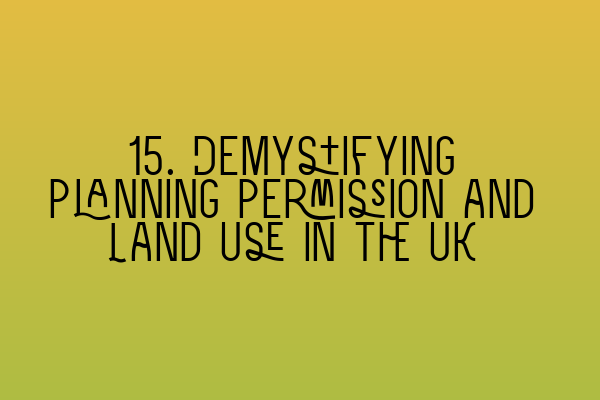Demystifying Planning Permission and Land Use in the UK
Planning permission and land use are crucial aspects of property law in the UK. Whether you’re a property developer, landowner, or someone simply looking to renovate or build on a piece of land, understanding the intricacies of planning permission is essential. In this article, we will demystify planning permission and land use regulations in the UK, providing you with the knowledge you need to navigate this complex area of law.
1. What is Planning Permission?
Planning permission is the formal consent required from the local planning authority (LPA) to carry out development on a piece of land. The UK government has established planning laws and regulations to ensure that development occurs in a controlled and sustainable manner. These laws aim to balance the needs of the community with the rights of the landowner.
Before starting any development project, it is vital to determine whether planning permission is required. Some minor works, such as internal renovations, may not require planning permission but could still require building regulations approval. However, more substantial developments, such as new buildings, extensions, or changes of land use, will often require planning permission.
Related Article: SQE 1 Practice Exam Questions
2. How to Obtain Planning Permission
To obtain planning permission, you must submit a planning application to the LPA responsible for the area in which the land is located. The application must include various documents, such as architectural plans, a description of the proposed development, and details of any potential environmental impacts.
It is advisable to engage a qualified solicitor or planning consultant to help you with the application process. They can guide you through the necessary steps, ensuring that your application is complete and addresses any potential issues or objections that may arise.
Once your application is submitted, the LPA will assess it within a specified period, usually eight weeks for minor applications and thirteen weeks for major ones. During this time, the LPA will consider the impact of the proposed development on the local area, including factors such as traffic, amenities, and environmental concerns. They will also gather feedback from the local community.
If the LPA approves your application, you will receive planning permission, usually subject to certain conditions. These conditions may relate to the design of the development, materials used, or the timing of the works. It is crucial to adhere to these conditions to avoid any potential legal challenges in the future.
Related Article: SQE 1 Practice Mocks FLK1 FLK2
3. Land Use in the UK
Land use refers to the specific purposes for which a particular piece of land is designated. The UK has various land use zones, such as residential, commercial, industrial, agricultural, and green belt areas. Each zone has specific guidelines and regulations governing the type of development permitted in that area.
Before embarking on any development project, it is essential to understand the land use designation of your property. This information can be obtained from the local planning authority’s land use policies or development plans. These plans outline the overall vision for the area and dictate the permitted land uses and developments within specific zones.
Changing the land use of a property often requires planning permission. It involves applying for a change of use, which typically involves demonstrating that the proposed development aligns with the objectives of the local planning authority and benefits the community.
Related Article: SQE 2 Preparation Courses
4. The Importance of Complying with Planning Permission and Land Use Regulations
Complying with planning permission and land use regulations is not only a legal requirement but also key to avoiding potential legal disputes or enforcement action by the local planning authority. Failing to obtain planning permission or deviating from the approved plans can lead to severe consequences, including fines, injunctions, or even demolition orders.
It is crucial to engage the services of a qualified solicitor who specializes in property and land law to ensure that your development project complies with all relevant regulations. They can help you navigate complex planning laws, negotiate with local planning authorities, and provide expert advice to protect your rights and interests.
Related Article: SQE 1 Preparation Courses
5. Conclusion
Understanding planning permission and land use regulations is vital for anyone involved in property development or land ownership in the UK. By demystifying these complex topics, we hope to have provided you with valuable insights into the planning process and the importance of complying with relevant regulations.
If you require further guidance or legal assistance regarding planning permission and land use, do not hesitate to contact SQE Property Law & Land Law. Our team of expert solicitors can provide you with comprehensive advice and representation tailored to your specific needs.
